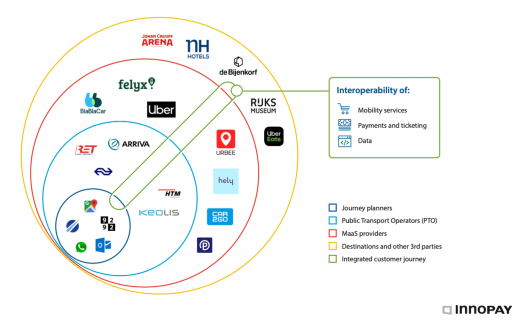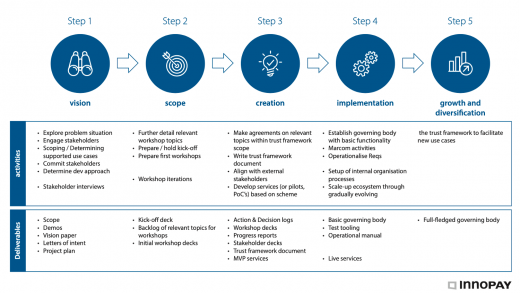5 key steps towards a scalable and inclusive digital MaaS ecosystem with the customer in control

Public transport operators (PTOs) and new mobility providers all share the same ambition with Mobility as a Service (MaaS): to move users away from car ownership towards consumable mobility options offered as a service. How? By making commuting with MaaS as convenient, flexible and seamless as car ownership. To achieve MaaS, including seamless travel connections, data sharing between users and the various providers in the mobility spectrum is essential. This requires a joint MaaS ecosystem and a common set of legally enforceable rules and agreements. This blog provides a view on open-data-driven MaaS ecosystems and provides five key steps towards their realisation.
Open MaaS ecosystems facilitate better data-driven propositions
Technological developments (e.g. APIs), regulatory changes (e.g. CDR, GDPR, PSD2) and collaborative mindsets enable digital collaboration between players in value chains. These collaborative partnerships are aimed at developing new business models, innovating services and reducing inefficiencies. Ultimately, these partnerships evolve into digital ecosystems in which data and functionalities and user experience are shared. Such collaborative ecosystems in which users have control of their data, have already been established in a wide range of industries, such as the energy, mortgage and logistics industries (i.e. EDSN, HDN, iSHARE).
A digital ecosystem for MaaS should integrate the services of PTOs, mobility providers (e.g. car sharing, bike sharing), data providers, tech vendors and other parties to optimise multimodal travelling. For example, PTOs and sharing initiatives can integrate existing propositions to improve interoperability between single mobility options and provide more personalised offerings, while data providers can accelerate access to services and optimise journey planning across various modalities. A visual representation of an open MaaS ecosystem is provided in Figure 1, showing similar providers grouped together in the layers.
The more closely ecosystem players work together, the more convenience can be achieved in multimodal travel propositions. For example, integration of public transport and other mobility providers results in MaaS propositions (e.g. Whim) that allow for interoperable travel connections. Deeper ecosystem integration of MaaS with alternative third parties offers further opportunities to optimise the user experience (e.g. food delivery, discounts on destination services).
‘Customer in control’ is a key principle in the formation of ecosystems
For multimodal travel to compete with car ownership, it is essential to allow customers to digitally onboard services and plan their journeys as quickly and easily as possible. INNOPAY strongly believes that a MaaS ecosystem provides the most value, trust and adoption when customers have control over their personal data. Passengers should be able to access services quickly and trigger data exchanges between ecosystem players (e.g. account information, travel preferences, travel and transaction history) to generate optimal travel options at all times. This should be done based on a verified customer identity and a form of ‘digital consent management’. Digital consent management allows customers to control who can access what types of personal data and to specify these access rights, preferably in a centralised dashboard. This allows customers to determine from which ecosystem players they would like to receive services.
Five essential steps towards developing a data-sharing trust framework for a scalable and inclusive MaaS ecosystem
At present, MaaS is still often developed on the basis of bilateral agreements and temporary pilot projects. An open and inclusive MaaS ecosystem is required for further upscaling and successful realisation.
PTOs and mobility providers are already collaborating in some contexts to accelerate inclusiveness and tackle various challenges in multimodal travel related to topics such as payments and ticketing (e.g. Dutch OV-chipkaart, Swedish Samtrafiken) and planning (e.g. Google Maps, CityMapper, Waze). These existing partnerships could serve as a foundation for further maturing into an open mobility ecosystem. Based on INNOPAY’s experience, the five essential steps towards developing a trust framework for MaaS are summarised in Figure 2, including key activities and deliverables.
The five key steps towards developing a trust framework for MaaS are:
- Vision. Develop a shared vision and common ground, and engage an initial coalition (‘critical mass’) of mobility players with significant geographical reach to develop the data-sharing trust framework
- Scope. Identify relevant use cases of integrated customer journeys with real added value for customers and all players involved and define the initial scope for the trust framework
- Creation. Develop a set of agreements on the business, legal, operational, functional and technical (BLOFT) aspects to set up the trust framework that ensures reliable and secure facilitation of data sharing between users and providers
- Implementation. Implement the trust framework with the participants in the initial coalition and test use cases
- Growth and diversification. After a few use cases have been successfully implemented, participants can further explore growth opportunities. This step includes adding participants and layers to the ecosystem to increase the user base and added value
If you are a mobility provider and you are interested in further exploring the opportunities of an open mobility ecosystem, please feel free to contact pepijn.groen@innopay.com.
About INNOPAY: INNOPAY is a consultancy firm specialised in digital transactions. INNOPAY is involved as a strategic partner of the Dutch ‘Innovation in PTO Payments’ programme, in which PTOs are working together to develop future payments and travel propositions.








